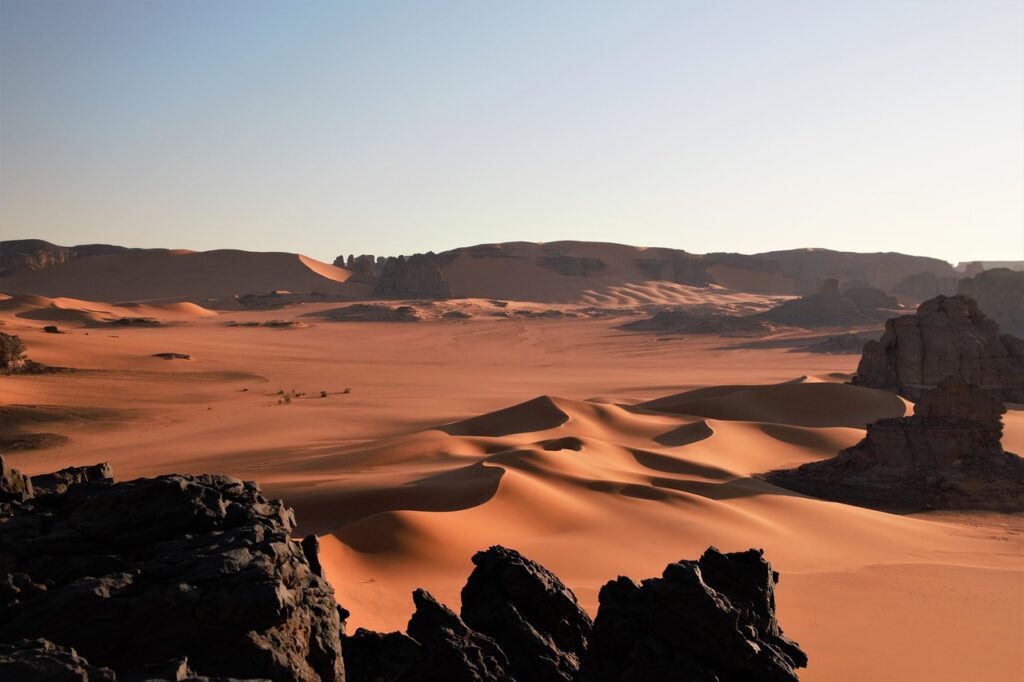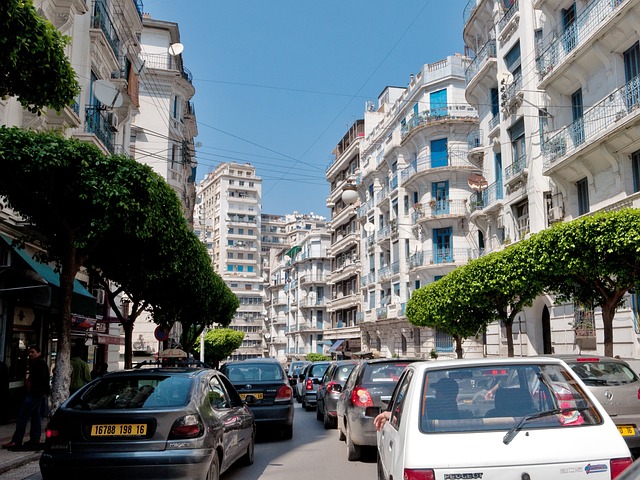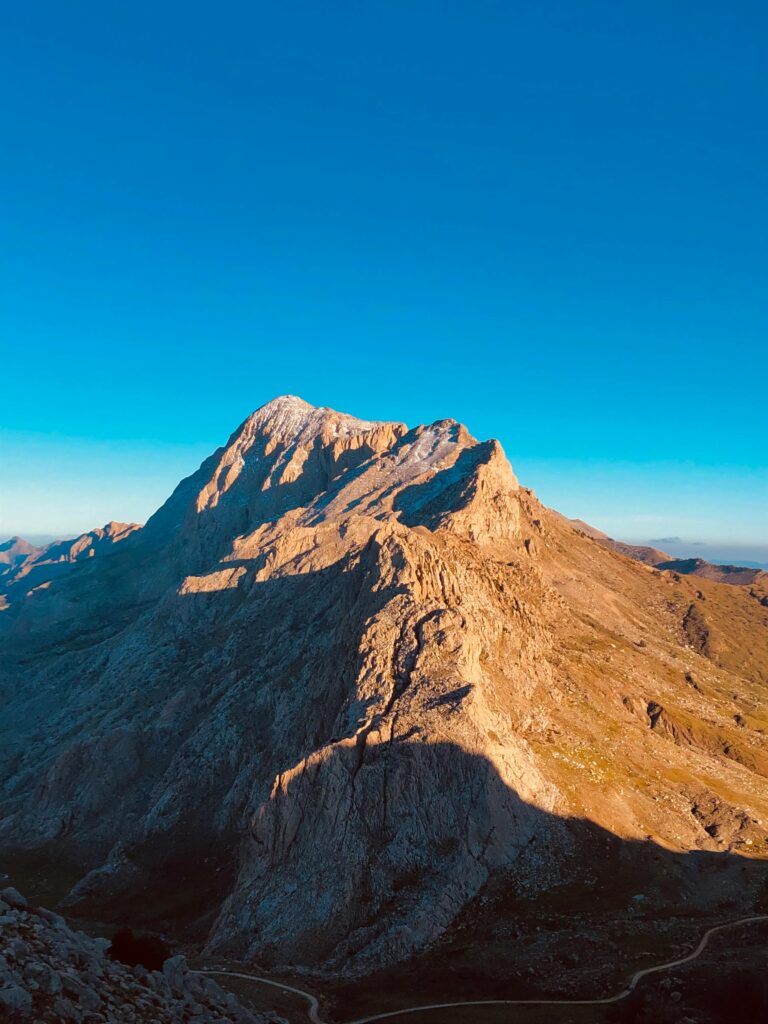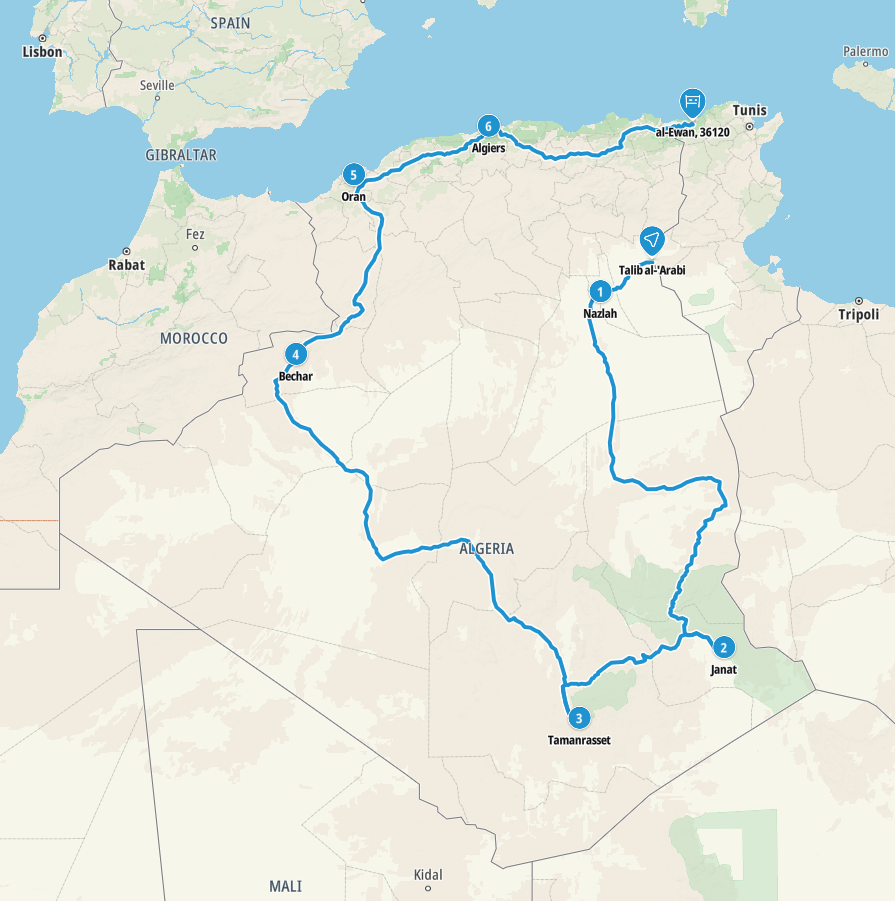Algeria / الجمهورية الجزائرية الديمقراطية الشعبية – Let’s explore here


What’s it like in Algeria?
Algeria is a large and beautiful country in North Africa, dominated in the south by the Sahara Desert. It’s the tenth largest country in the world and the largest in Africa. Between the coast and the desert lie mountains, valleys, and grassland plateaus.
As with many nations in North Africa, it has a very long, rich and troubled history. It is also the centre of the Maghreb (the western part of the Arab world). Its neighbours include Morocco (which it has broken off relations with), Tunisia, Libya, Niger, Mauritania, Western Sahara and Mali.
It has a population of around 45 million, about 10% of whom live in the capital, Algiers. The highest point is Mount Tahat in the Hoggar Mountains in southern Algeria, at 9,541 ft (2,908 m) above sea level.

A bit about the history of Algeria
Ancient and Medieval History
Algeria’s history dates back to ancient times when it was inhabited by Berber tribes. The region was influenced by various civilisations, including the Phoenicians, who established trading posts along the coast, and the Romans, who controlled much of northern Africa. The Romans left a significant cultural and architectural legacy, particularly in cities like Timgad and Djemila. After the fall of the Roman Empire, the area came under the control of various empires, including the Vandals, Byzantines and later the Arab Caliphates.
Islamic Rule and the Ottoman Empire
In the 7th century, Arab forces brought Islam to the region, and Algeria became part of the Islamic Caliphate. Over the following centuries, the Berber dynasties such as the Almoravid and Almohad empires rose to power, ruling over a large portion of north Africa. In the 16th century, the Ottoman Empire expanded into Algeria, and the region became part of the Ottoman domain. Under Ottoman rule, Algeria was governed by a series of local rulers known as beys, who maintained a degree of autonomy while paying tribute to the Ottoman sultan in Constantinople.
French Colonisation
In 1830, France invaded Algeria, beginning a period of colonisation that would last for over 130 years. The French imposed direct control over the country, claiming it as part of France and encouraging French settlers (known as colons) to establish farms and towns. The indigenous Berber and Arab populations faced land dispossession, forced labour and cultural repression. Resistance to French rule grew, culminating in several uprisings, most notably the revolt led by Emir Abdelkader in the mid 19th century.
The Algerian War of Independence
By the mid 20th century, Algeria’s desire for independence from French colonial rule intensified. The National Liberation Front (FLN) was formed in 1954 and launched a full-scale war of independence against French forces. The conflict, known as the Algerian War (1954–1962), was brutal and involved widespread violence and atrocities on both sides. The war sparked intense debate within France and led to the fall of the French government under Prime Minister Pierre Mendès-France. After years of fighting and negotiation, Algeria gained its independence in 1962, following the Evian Accords, which marked the end of French rule.
Post Independence Era
After gaining independence, Algeria faced significant challenges, including rebuilding the country, addressing economic difficulties, and integrating its diverse population. The FLN became the dominant political force, and Ahmed Ben Bella became the first president of independent Algeria. The country pursued a policy of socialist economic reforms, nationalising industries, and focusing on self sufficiency. However, political instability and economic challenges continued throughout the 1960s and 1970s.
Civil War and Modern Politics
In the 1990s, Algeria plunged into a brutal civil war after the cancellation of elections that were set to be won by the Islamic Salvation Front (FIS), an Islamist political party. This led to a decade of violence between the government and various armed Islamist groups, resulting in the deaths of tens of thousands of people. The conflict gradually ended by the early 2000s, but Algeria remained politically tense and divided.
Since the end of the civil war, Algeria has maintained a relatively stable government, though political freedoms remain limited, and the country still faces significant economic and social challenges. The FLN continued to dominate politics, although in recent years there have been calls for greater democracy and political reform. In 2019, protests led to the resignation of long time president Abdelaziz Bouteflika after two decades in power.
Contemporary Algeria
Algeria today is a republic with a mixed economy based on oil and gas exports, which provide the majority of the country’s revenue. Despite its wealth in natural resources, Algeria faces high unemployment, corruption and social inequality. The political landscape remains dominated by the military and FLN, but popular demands for reform continue to shape the future of the country.


Algeria road trip
For our Algerian journey we travel from Tunisia via Chott el Djerid (the Lagoon of Palms) into Algeria, before heading down the eastern border to Djanet and Tamarasset in the Sahara desert. We’ll then travel inland parallel to the Mali border to Bechar in the west of Algeria. Finally we’ll be heading up the Mediterranean coast, and the Capital, Algiers, before heading back to Tunisia.
Algeria is so huge that each leg of the journey will take many days, each of which will no doubt be stiflingly hot. Lots of planning is required to ensure enough provisions are at hand (especially water, food, fuel, rescue equipment) should there me any mishaps in the desert.
Initially we’d planned to travel from Spain to the north western coast of Algeria via ferry, however the cost is quite high (2024). Hence we’re now travelling from Sicily to Tunisia, then overland to Algeria.
Map of our road trip through Algeria

This is a map of our road trip through Algeria.
Our route takes us from Taleb al’Arabi – El Oued – El Menia – In Salah – Djanet – Idles – Tamanrasset – In Salah – Reggane – Timourdi – Timimour – Bechar – Naama – Mascara – Oran – Algiers – al’Ewan
What’s it like to drive in Algeria?
They drive on the right hand side of the road in Algeria. In the north, along the coast, driving is fairly easy going, although minor accidents are common. For anyone considering driving in the capital, it’s not for the light hearted, as with all north African capitals.
The land border between Algeria and Morocco is closed (2025), and has been for a long time.
Driving in the desert
Driving in the desert takes experience and should never be undertaken lightly. Having the correct tyres, as well as specialist rescue equipment, and digging implements can literally save your life. Fuel stations are irregularly spaced, so extra fuel cans for spare fuel are required. Similarly always prepare by taking lots of extra water and food should there be any mishaps.
Police checkpoints
Local and national police have checkpoints set throughout the country, with more in the south than the north. Generally the police are looking out for you, and will insist in escorting you in some instances. Provision of a mobile phone number with an Algerian sim card can help ease passage – although the police will expect you to check in with them at the next checkpoint – so ensure that you do so.
Do you require an international driving permit in Algeria?
We’ve created a dedicated page to driving abroad, which answers this question, and more, which you might find helpful.
Can you use your UK driving license when driving through Algeria?
We’ve created a dedicated page to driving abroad, which answers this question, and more, which you might find helpful.
Do I need a carnet de passages to drive in Algeria?
We’ve created a dedicated page to driving abroad, which answers this question, and more, which you might find helpful.
What is the weather like in Algeria?
The best time to visit coastal Algeria is between Spring and Autumn. The best time to visit southern Algeria is between December and February.
What currency do they use in Algeria?
In Algeria they use the Algerian Dinar. Cash is widely used. The use of credit / debit cards is not widely accepted. Travellers cheques are not readily accepted. There are many ATMs in cities and towns throughout the country, although most do to accept foreign-country issued cards.
You should make yourself aware of the amount that your bank charges you for using credit and debit cards abroad. Often credit cards are cheaper for purchasing items directly, and for withdrawing cash from ATMs.
What language do they speak in Algeria?
They speak Arabic and Berber in Algeria. French is also widely spoken.
What time zone is Algeria in?
Remember, when you’re planning your next trip to take a look at what time zone it’s in.
Do I need a visa to visit Algeria?
We’ve created a dedicated, more comprehensive page on visas, which you should find helpful. Check it out!
Is wild camping legal in Algeria?
Yes, wild camping is fine in Algeria.
What plug / socket type do they use in Algeria?
In Algeria they use plug / socket types C and F.


Health issues in Algeria
Is it safe to drink water in Algeria?
No, it is not safe to drink tap water in Algeria. Bottled water is readily available throughout the country.
What vaccinations are required for Algeria?
This NHS website is kept up to date with all relevant information on vaccinations in Algeria.
Phones in Algeria
What is the country calling code for Algeria?
The country calling code for Algeria is +213
What are the emergency phone numbers in Algeria?
- The emergency number for police in Algeria is: 1548
- In Algeria, the emergency number for ambulance is: 14
- The emergency number for fire in Algeria is: 14
- The emergency number for Gendarme (inter-city/rural police) in Algeria is: 1055
If you’ve got some useful info that you’d like to share, let us know!
And don’t forget to check out all the other pictures!
